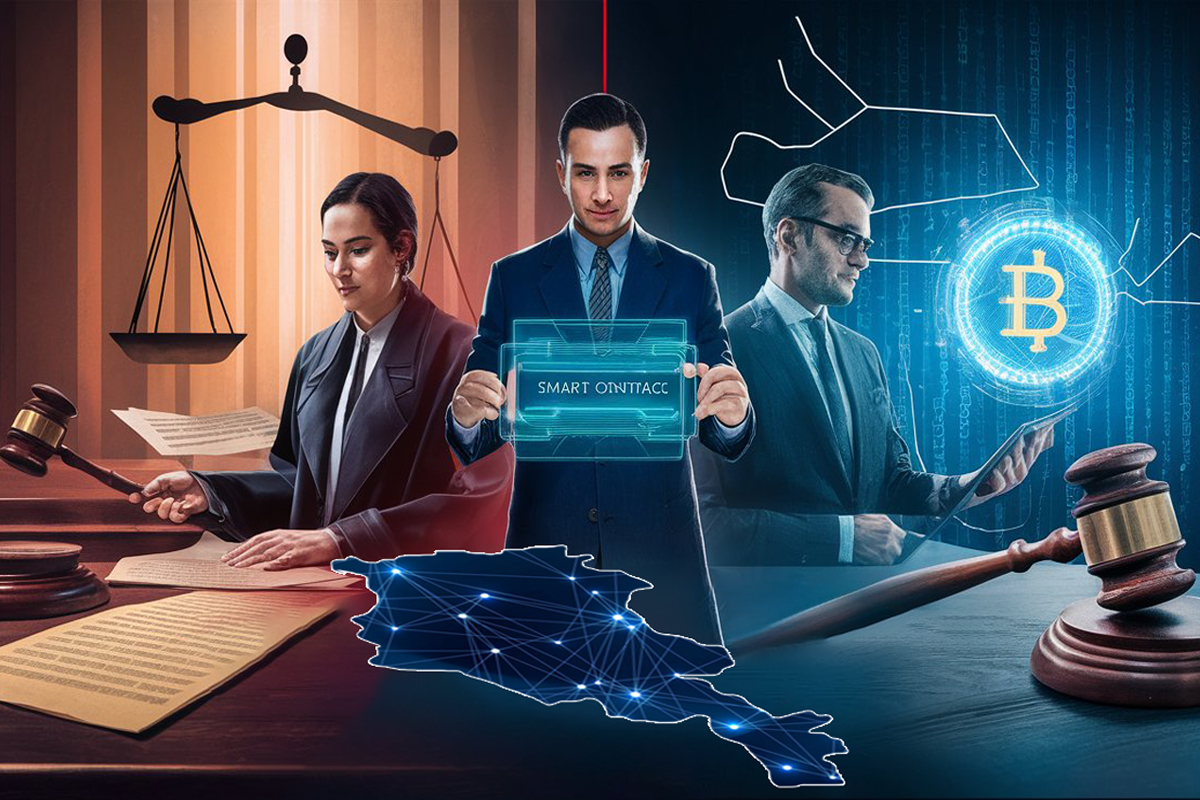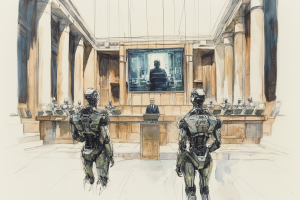Iravaban.net‘s innovative “LegalTech Armenia” series aims to uncover the convergence of law and technology. Throughout this series, we will explore how the digital revolution is reshaping the legal landscape in Armenia and around the world.
The fourth article in this groundbreaking series, “Blockchain and Law: The Era of Inviolable Contracts,” delves into how blockchain technology is transforming contract law and intellectual property protection.
Our team of journalists and experts, equipped with cutting-edge technological tools including advanced artificial intelligence applications, will present in-depth analyses, exclusive interviews, and compelling narratives, complemented by informative visuals and infographics. We will unveil how blockchain, machine learning, and other innovative technologies are revolutionizing legal practice, judicial systems, and legislative processes.
Introduction
Blockchain, a decentralized and immutable data recording technology, is revolutionizing numerous fields, with law being no exception. This article explores how blockchain is transforming legal practice and ushering in a new era of inviolable contracts.
Fundamentals of Blockchain
Blockchain functions as a decentralized digital ledger. It comprises “blocks” containing transaction information. Each new block is cryptographically linked to its predecessor using a hash function, creating an immutable and tamper-proof chain.
Key features of blockchain include:
- Decentralization: Data is distributed across all network participants, eliminating the need for a central server.
- Immutability: Once recorded, data on the blockchain cannot be altered or deleted.
- Transparency: All transactions are visible to all network participants.
- Security: The use of advanced cryptographic methods ensures high data integrity and security.
Types of Blockchain in the Legal Field
The legal field employs various types of blockchain:
- Public blockchains: Open to all and frequently used for cryptocurrencies. For instance, the Bitcoin blockchain is utilized for copyright registration. The Proof of Existence service enables users to timestamp a document by submitting its cryptographic hash to the Bitcoin blockchain, providing indisputable proof of the document’s existence at a specific point in time.
- Private blockchains: These are limited access systems often employed in corporate environments. A prime example is JP Morgan’s Quorum blockchain platform, used for managing financial transactions and contracts. It allows the bank to conduct swift and secure transactions while maintaining confidentiality.
- Consortium blockchains: These are semi-open systems managed by a group of organizations. The R3 Corda platform exemplifies this, being used by a consortium of banks and law firms for smart contracts and interbank transactions. It allows participants to share data exclusively with parties involved in a specific transaction.
- Hybrid blockchains: These combine features of both public and private blockchains. The XDC Network is a hybrid blockchain used for trade finance and contract management. It allows companies to leverage the transparency of public blockchains while maintaining the confidentiality of sensitive data.
Examples of Blockchain Applications in the Legal Field
- Smart contracts: These self-executing digital contracts automatically implement predefined terms. The OpenLaw platform enables lawyers to create and manage legal documents on the Ethereum blockchain. It’s utilized for various legal documents, including employment contracts and lease agreements.
- Intellectual property protection: Blockchain can effectively register and protect copyrights, patents, and trademarks. The KodakOne platform employs blockchain technology to register and safeguard photographers’ copyrights. It also streamlines the licensing process and facilitates payment collection.
- Notary services: Blockchain can revolutionize document validation and notary services. The Notarize platform utilizes blockchain technology to provide round-the-clock online notary services. It allows users to validate documents 24/7, ensuring both security and traceability.
- Electoral systems: Blockchain can ensure secure and transparent elections. The Voatz platform leverages blockchain technology to provide a mobile voting system. It has been successfully implemented in several pilot programs in the US, including for overseas military voting.
- State registries: Blockchain can enhance the maintenance of state registries. Sweden’s land registry (Lantmäteriet) is pioneering a project in collaboration with ChromaWay, utilizing blockchain technology for land ownership registration and transactions. This innovative system significantly reduces fraud risk and accelerates transaction processes.
International Experience
- Estonia: Since 2008, Estonia has been at the forefront of blockchain implementation through its e-Estonia program. The country utilizes KSI (Keyless Signature Infrastructure) blockchain to secure government data and digital services.
- Dubai: In 2016, the Dubai government unveiled its ambitious “Blockchain Strategy 2021” program, aiming to establish Dubai as the world’s first blockchain-managed city by 2021. The program encompasses the digitization of government documents, transactions, and licenses.
- Sweden: The Swedish land registration authority (Lantmäteriet) is spearheading the use of blockchain for land registration and real estate transactions. This innovative project aims to significantly reduce transaction time and costs.
- Japan: The Japanese government has implemented blockchain technology in its public procurement system to enhance transparency and efficiency.
- Malta: Known as the “Blockchain Island,” Malta has adopted pioneering legislation regulating blockchain technologies and cryptocurrencies. The country has established a comprehensive legal framework that governs virtual financial assets and smart contracts.
Situation in Armenia
Armenia is also making strides in embracing blockchain technology:
- EAEU digital initiatives: In 2017, Armenia joined the Eurasian Economic Union (EAEU) digital initiatives, which encompass the application of blockchain technologies. This strategic move allows Armenia to participate in regional blockchain projects and facilitate knowledge exchange.
- Cryptocurrency regulation: The global cryptocurrency landscape, including Bitcoin, altcoins, tokens, and stablecoins, presents both opportunities and challenges. The absence of a comprehensive legislative framework, both in Armenia and globally, poses obstacles to innovation in this field. Recognizing this, the Central Bank of Armenia has initiated public discussions on a draft amendment to the “Law on Crypto Assets” and related legislation.
The Role of the Armenian Lawyers Association and Iravaban.net
The Armenian Lawyers Association (ALA) is at the forefront of studying and shaping the legal aspects of blockchain technology. ALA President Karen Zadoyan emphasizes: “Blockchain has the potential to revolutionize our legal system by dramatically increasing transparency and efficiency. We have conducted comprehensive studies of international best practices and stand ready to support competent state bodies in creating an appropriate legal framework for this transformative technology.”
Iravaban.net plays a crucial role in disseminating information and raising awareness by publishing in-depth analytical articles on blockchain topics. The platform has evolved into an indispensable resource for lawyers seeking to stay informed about the latest developments at the intersection of blockchain and law.
Challenges and Solutions
Technical Challenges
Scalability: Blockchain networks often face performance issues when handling a large volume of transactions. For example, Bitcoin can process only 7 transactions per second, while traditional payment systems like Visa can handle thousands in the same timeframe. This scalability issue presents a significant challenge when considering blockchain for large-scale legal processes.
Energy consumption: Many blockchain systems, particularly those utilizing the “Proof of Work” consensus mechanism, consume substantial amounts of electricity. This high energy demand raises concerns about environmental sustainability and may conflict with existing environmental protection laws and regulations.
Potential solutions: Emerging blockchain technologies, such as the “Proof of Stake” consensus mechanism and “sharding,” aim to address these challenges. For instance, Ethereum 2.0’s transition to a “Proof of Stake” system is expected to dramatically reduce energy consumption while improving scalability.
Legal Challenges
Data protection and privacy: The immutable nature of blockchain can potentially conflict with data protection laws, such as the European Union’s General Data Protection Regulation (GDPR). A prime example is the GDPR’s “right to be forgotten,” which is inherently challenging to implement in a blockchain system where data cannot be easily erased or modified.
Iravaban.net has proactively addressed this issue by announcing that certain information published on the site will be edited upon individual requests to comply with the right to be forgotten.
Jurisdiction and governance: The decentralized nature of blockchain complicates the determination of jurisdiction in case of disputes. For instance, if a smart contract malfunctions or doesn’t perform as intended, it may be unclear which country’s laws should govern the resolution process.
Potential solutions: International cooperation is crucial in addressing these legal challenges. The European Parliament’s adoption of a resolution on blockchain and cryptocurrency regulation serves as a step in this direction. Additionally, innovative “off-chain” and “side-chain” solutions are being developed, allowing for the storage of certain data outside the main blockchain. This approach offers greater flexibility in complying with data protection laws while maintaining the benefits of blockchain technology.
Future Prospects
Blockchain technology has the potential to revolutionize virtually all aspects of legal processes, from contract formation to court proceedings. Armenia, with its robust IT sector, is well-positioned to become a regional leader in the legal application of blockchain technologies.
Looking ahead, we can anticipate:
- Automated legal services: Smart contracts have the potential to automate numerous legal processes, significantly reducing costs and expediting service delivery.
- Enhanced transaction security: Blockchain can ensure unprecedented levels of transaction immutability and traceability, substantially mitigating fraud risks.
- Streamlined judicial system: Blockchain technology can be leveraged for efficient case and evidence management, potentially accelerating judicial processes.
- Emergence of new legal specialties: We may see the rise of new professional roles, such as blockchain-specialized lawyers or smart contract auditors.
Conclusion
Blockchain represents not just a technological advancement, but a legal revolution. It offers unprecedented levels of security, transparency, and efficiency while presenting new challenges that must be addressed. Armenian legal professionals must proactively prepare for these changes by acquiring specialized knowledge and skills in blockchain technology.
The integration of blockchain into the legal field necessitates a systematic approach, encompassing legislative reforms, specialized training programs, and initiatives to raise public awareness. The Armenian Lawyers Association and Iravaban.net are committed to spearheading this transformative process, aiming to establish Armenia as a leader in legal innovation.
It’s crucial to remember that blockchain, like any powerful tool, can be wielded for both beneficial and potentially harmful purposes. It is our collective responsibility to ensure that this transformative technology serves the interests of justice and equality.
The Armenian legal community faces several critical challenges:
- Legislative reforms: There is an urgent need to develop and enact comprehensive legislation governing the use of blockchain technologies in the legal domain. This should address the legal status of smart contracts, establish the evidential value of blockchain-stored data, and provide a regulatory framework for blockchain platforms.
- Education and training: The legal community must actively engage in studying blockchain technologies. Universities should integrate blockchain and law courses into their curricula, while practicing lawyers should participate in ongoing professional development programs.
- Ethical considerations: It is imperative to develop robust ethical guidelines for the application of blockchain technologies in the legal field. These guidelines should address critical issues such as data privacy, transparency, and fairness.
- International cooperation: Armenia should actively participate in international initiatives and knowledge-sharing forums focused on the legal regulation of blockchain. This will enable us to learn from global best practices and align our approaches with international standards.
- Fostering innovation: The legal profession should encourage innovative thinking and incentivize the exploration of novel applications of blockchain technology in legal practice.
While blockchain offers immense opportunities for enhancing the legal field, it also introduces new challenges. Only through diligent preparation and active engagement in the development of this technology can we fully harness its benefits while minimizing potential risks.
We extend an open invitation to all stakeholders – legal professionals, technologists, legislators, and civil society representatives – to join this crucial dialogue and actively contribute to shaping the future of Armenia’s legal system in the blockchain era.
Stay tuned for the fifth article in Iravaban.net’s “LegalTech Armenia” innovative series: “Artificial Intelligence and Legal Ethics: New Challenges and Opportunities.” This upcoming piece will explore how artificial intelligence (AI) is transforming legal practice and the ethical considerations this technological shift raises.
The series was conceived by Karen Zadoyan, the president of the Armenian Lawyers’ Association.


















